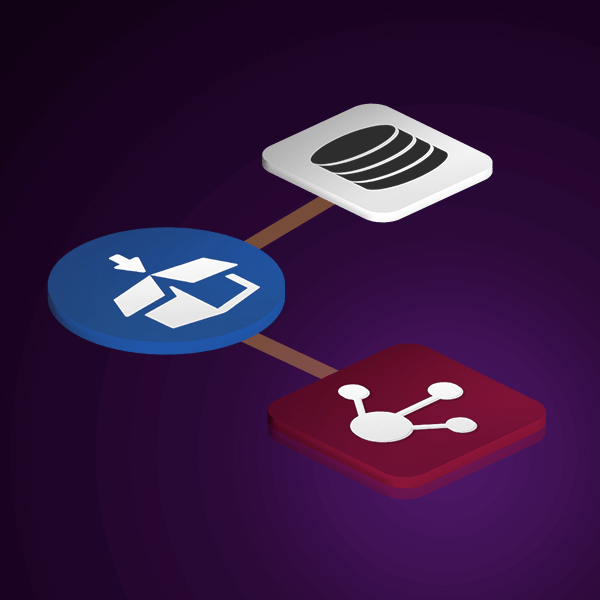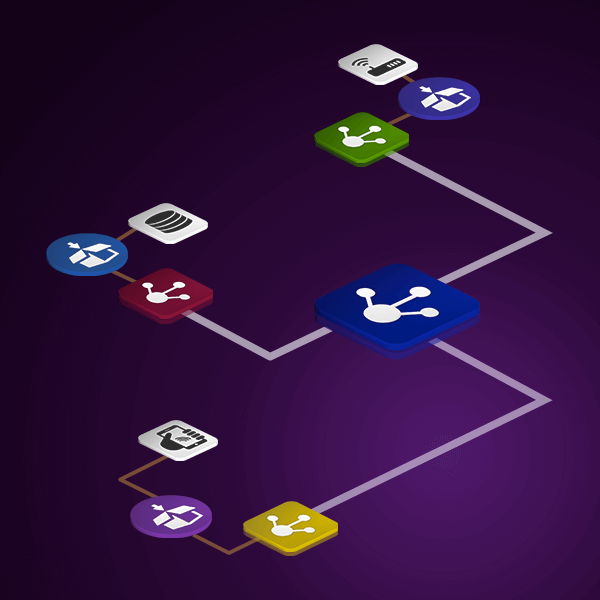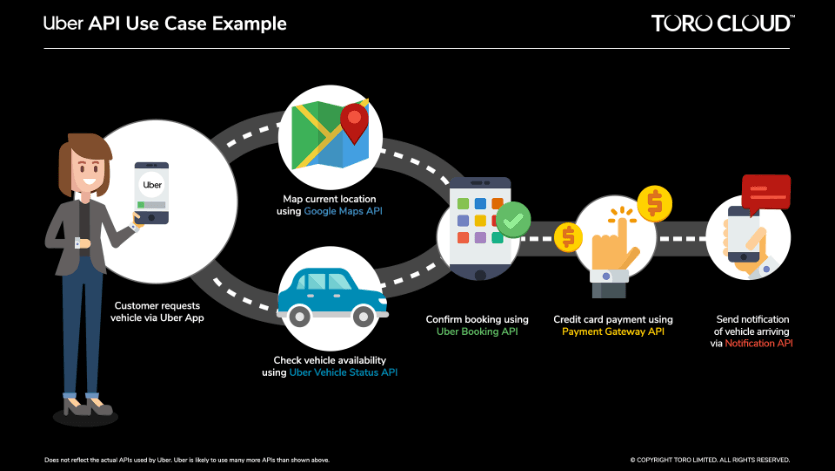First let’s define an API
An API (or “Application Programming Interface”) is a software intermediary for an application or service that enables other applications or services to send them requests and receive responses to those requests. The API will define the terms of the request and response such as the structure of the data, the data required, the protocol and security settings.
An API makes it easier to integrate applications and services as the API forms a “contract” governing the communication between them. This gives developers certainty when integrating systems and can also enable larger monolithic services to be broken down into smaller independent services with defined interfaces.
API adoption has exploded
The ability to innovate at an unprecedented rate is the key to succeeding in today’s fast-paced digital world. In recent years, many businesses have realized APIs, that set clearly defined methods of communication among various software components, are an effective way to enable the digital transformation of their enterprise.
Even though APIs have been around since the 1960s, Web APIs only started to gain popularity/traction during early 2000s and blew up earlier this decade with the adoption of cloud computing and Internet of Things (IoT) devices.
According to API directory ProgrammableWeb, the number of Web APIs has grown 1,000% this decade alone from less than 2,000 listed in the directory at the start of the decade to over 20,000 today.
So what is an API Economy?

Companies create value from proprietary data and processes by publishing APIs

An ecosystem emerges as the number of companies publishing APIs expands

New unanticipated use cases are created from the ecosystem of APIs
Once a single organization decides to publish an API which opens up its proprietary processes, systems, or data, it then createsvalue and a potential revenue stream allong with its business partners. This creates a ripple of effect to organizations thus creating an ecosystem popularly know as API economy where APIs produce value. These APIs operate independently and also enable new and unique applications to be created from a mashup of several APIs.
Instead of publishing an application that solves a specific use case, in an API economy, a business can package the functionality as an API, and make it available for entirely new use cases that could not have been anticipated by the publisher of the API.
Take Uber for example. Uber was able to take public APIs, such as Google Maps and a payment gateway, combine them with their own unique processes and then deliver them in a mobile application that would end up changing the entire transportation industry.

APIs can be opportunities to create new revenue streams for existing companies whilst API first companies such as Twilio and Contentful have built businesses entirely around usage of their services via APIs.
This is having a very real impact on a business's revenue streams. Platform Revolution authors state that 50% of Salesforce.com revenues come from its API while for travel site Expedia, a whopping 90% of its revenue is conducted via its API.

The API Economy is changing everything
“In the past, the biggest companies were those closest to the data, able to impose a tax, or lock-in to their platform,” says Matt Murphy, a managing director of Menlo Ventures, a seed to growth venture capital firm. “In the API economy, the biggest companies may be the ones that aggregate the most data smartly and open it up to others.”
The API economy fundamentally changes the business value chain, forcing business to rethink their strategies and expand into new markets. When IBM premiered its question-answering computer system capable of answering questions posed in natural language, called Watson, on the quiz show Jeopardy! everyone was curious what its first commercial application would be. The answer came two years later when the tech giant announced that Watson would be used for utilization management decisions in lung cancer treatment.
Previously, IBM may have maintained a focus on lung cancer treatment, but in the era of the API economy, a decision was made to open access to Watson through APIs, making it available to the entire world. “By sharing IBM Watson’s cognitive abilities with the world, we aim to fuel a new ecosystem that accelerates innovation, creativity and entrepreneurial spirit,” said Michael Rhodin, Senior Vice President, IBM Software Solutions Group.
“The significance here is that IBM will enable other companies, large and small, to embed access to Watson into their products and services, or better yet, to build applications on top of it,” said Mohamad Makhzoumi, Partner at New Enterprise Associates. “This could bring about a paradigm shift not only in how people interact with computers but in how we live our lives.”
As IBM decided to make Watson open to the public by creating an API, the applications of the AI-powered computer system expanded to cover everything from healthcare to education to weather forecasting to fashion to tax preparation. IBM programmers can now add vital functionalities to Watson while other developers leverage this system to address real world problems.
Looking Ahead
Although an API defines a contract of communication between two computer systems there have been several competing formats for API definitions. More recently one of those formats, OpenAPI, has emerged as the winner in these format wars which will result in more standardisation and better tooling for developing and managing APIs.
The explosion of the adoption of APIs has also opened a door for hackers to malicioously abuse weak API security practices.
Hackers will be able to easily access data from public APIs if there is no strong authentication. The data can be used in ways that businesses would not deem possible. While most data exposed by APIs is considered non-critical, there is a much wider issue of trust that must be taken into consideration.
Users today care about their privacy and security, and they already harbor resentment against the aggregators’ tightening grip on data access. API-related security incidents undermine the potential of the API economy.
Publishers of APIs can mitigate security concerns by adopting techniques such as OAuth2 authentication of users, enforcing SSL communication to convert data transfers into codes, concealing data at rest, and applying network security.
The modern digital economy is built on APIs, which allow different software components to communicate with one another, enabling businesses to create ecosystems around their services. In the API economy, businesses must rethink their strategies to reach the agility necessary for delivering digital innovation at the pace of business. Those that succeed will be able to extend their reach into a larger ecosystem and take advantage of the latest technical innovations faster than their competitors.





